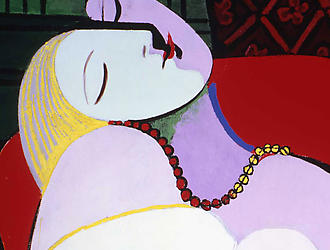The New York Times
Homing in on a Couple's Basquiat Drawings
January 31, 2014Longtime collectors like Herbert and Lenore Schorr are luckier than most. In 1981, while visiting the Annina Nosei Gallery, which was then on Prince Street in SoHo, the couple met Jean-Michel Basquiat, fell in love with his work and bought one of his paintings. That purchase was quickly followed by others — drawings as well as canvases — and, over the years, the Schorrs amassed one of the most important Basquiat collections in the country. The Schorrs also became friends with the artist, who died of a drug overdose at 27 in 1988, and occasionally bought a painting or drawing right out of his Manhattan studio.
“Jean-Michel himself was fascinated that we always gravitated toward the complex work,” said Ms. Schorr, who argues that the drawings are “the key to all his work.”
While institutions like the Studio Museum in Harlem and the Andy Warhol Museum in Pittsburgh have shown Basquiats from the Schorrs’ collection, there has never been an exhibition focusing chiefly on the couple’s works on paper by the artist. Now, however, the Schorrs are lending 22 of their Basquiat drawings for a show running from May 1 through June 13 at the Acquavella Galleries. Eleanor Acquavella, one of the gallery’s directors, said she welcomed the opportunity because “there is a complex side to his drawings that few people are familiar with.”
In addition to the 22 drawings, dense with the artist’s signature graffiti scrawls, words and images, the Schorrs will lend two paintings that incorporate drawing and collage with some of the same imagery.
Fred Hoffman, a dealer turned curator who helped organize a traveling Basquiat exhibition that opened at the Brooklyn Museum in 2005, is also assembling the Acquavella show. “About two and a half years ago, I realized how Basquiat’s works on paper had been overlooked and how important they are,” he said. “In contrast to most artists, Basquiat’s drawings were not a solution to a problem. They were complete works unto themselves.”
As is often the case these days with exhibitions at blue chip galleries, nothing at the Acquavella show will be for sale. “It is strictly educational,” Ms. Schorr said. “We still own all our paintings and drawings by the artist.”
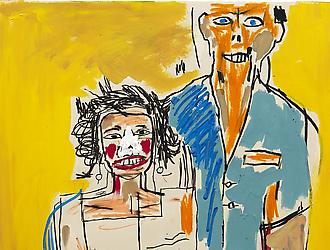
Wall Street Journal
The Secret Life of Lucian Freud
October 22, 2013Sigmund Freud became famous by psychoanalyzing mankind’s crazy antics. If only he had seen what his grandson, the painter Lucian Freud, got up to: paying his bookies off with art, spending time with his adult children by painting them naked…
Speakeasy sat down recently with David Dawson, Freud’s studio assistant from 1989 until Freud’s death in July 2011. Mr. Dawson’s photos of the artist are currently on display at Vienna’s Sigmund Freud Museum, coinciding with a Freud retrospective at the city’s Kunsthistorisches Museum.
Here, an edited transcript.
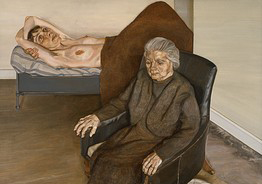
Art Asia Pacific
Chairman of Christie's Asia to Join Acquavella Galleries
February 18, 2013Ken Yeh, former Chairman of Christie’s Asia, has been appointed director of New York’s Acquavella Galleries. Assuming the role in May 2013, Yeh will develop the gallery’s business in Asia while based in New York and Hong Kong.
With 15 years at Christie’s specializing in Impressionist and Modern Art, Yeh has established strong relationships with Asian collectors worldwide.
“This opportunity at Acquavella is a great chance to work with one of the best galleries, if not, the best gallery in the world,” Yeh said in a phone interview on Monday. “I am sad to leave Christie’s, and it was not an easy decision, but I felt like this was the right time for me to make a career move.”
Yeh joins co-directors Michael Findlay, Esperanza Sobrino and Tsutomu Takashima at Acquavella.
“I am thrilled to be working with Ken again,” Findlay said in an email to ArtAsiaPacific. Findlay hired Yeh at Christie’s 15 years ago, and the two have been friends and occasional colleagues since.
Yeh holds an MBA in Finance from Columbia University and a BA in French Literature from Fu Jen Catholic University in Taipei, Taiwan. He was born in Taiwan and is fluent in French, English, Mandarin and Taiwanese.
With Yeh’s large network and understanding of how to conduct business in Asia, the appointment is a strategic choice, and certainly more economical than the trend of galleries spending millions of dollars establishing a physical presence in Hong Kong.

Enoc Perez show at the Corcoran Gallery of Art
Enoc Perez Utopia
November 10 - February 10, 2012Enoc Perez’s lushly figured paintings of modernist buildings at once exploit and question the seductions of architecture as well as painting itself. The exhibition presents two new bodies of work, one focusing on the Marina Towers in Chicago and the other a commissioned painting of the Watergate in Washington, D.C. These architectural portraits evoke modernism’s futurist aspirations as well as the sadness of an always-impossible ideal.
On a basic level, Perez’s work is about painting: the pleasures of its translucent shimmer and viscous clots, the histories embedded in its play of figure and ground, and its ambitions to arrest time. However, little is traditional about his technique, which uses photographs and found imagery from postcards and magazines and which combines elements of brushwork with a sort of primitive printmaking. Perez makes a preparatory drawing for each color that will be in a finished painting, coats the back of the paper with oil stick, and then presses the image from the intermediary paper onto the canvas. This transfer process mimics the processes of mechanical reproduction while drawing upon conventional painting techniques.
Perez harnesses this mongrel technique to probe the medium’s ability to reconstitute time and place, exploring how technology and memory create experience. Over the last 15 years he has sought out landmarks of the modernist style, tracing a map of the urban environment that is as much mental and social as it is physical. His painted city includes the Seagram Building and Lever House in New York City, the Eero Saarinen TWA Terminal at JFK Airport, and Casa Malaparte on the island of Capri, Italy. While investigating these structures as symbols of power, futurism, and utopian promise, Perez’s canvases, heavy with paint and physical reality, simultaneously return to them their corporeality.
The Marina Towers series (2011–12), exhibited for the first time at the Corcoran, consists of eight renditions of Chicago’s skyscrapers, built in 1962. Echoing Claude Monet’s paintings of the Rouen Cathedral and Andy Warhol’s Marilyns, Perez obsessively refigures the architectural icon, shading his palette of reds, yellows, and purples according to mood and time of day. The works encourage intense, repeated looking at an object that is at once static and ever-shifting, compressing the arc of days and years into the confines of eight pictures.
Perez will install a painting of the Watergate—the Washington, D.C., architectural complex built between 1963 and 1971—in the Corcoran’s Rotunda. Stretching across the gallery’s two rounded walls, Perez’s painting is a cloud of swooping curves and jaunty angles, made stark with a palette of blacks, whites, and grays. The intertwining of the painted and printed is here made apparent, as paint is pressed and brushed on top of a photographic image. The resulting work is cinematic in effect, surrounding the viewer in an experience that is inescapably redolent of the scandal that brought the building its fame.
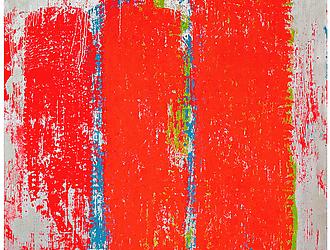
Acquavella's new Twitter Account

The Wall Street Journal
Scarred, Inspired by Fire
September 7, 2012James Rosenquist Shows New Work at New York's Acquavella Galleries
Continue Reading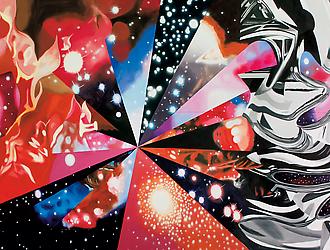
The Wall Street Journal
Commerce and Collecting: The Value of Art
May 31, 2012Review of Acquavella Galleries Director Michael Findlay's book, "The Value of Art" by Alexandra Peers.
Book published by Prestel, 176 pages, $29.95.

The New York Observer
Michael Findlay’s ‘Value of Art’ Tells Tales, Just Wants People to Like Art
May 2, 2012Review of Acquavella Director Michael Findlay's new book "The Value of Art" by Dan Duray.
Book published by Prestel, 176 pages, $29.95.

Art in America
Michael Findlay on the Value of Looking
April 30, 2012Review of Acquavella Director Michael Findlay's new book "The Value of Art" by Brian Boucher.
Book published by Prestel, 176 pages, $29.95.
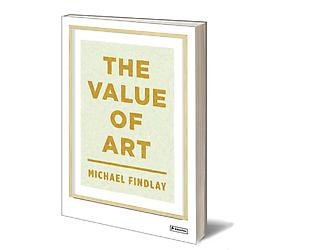
ARTnews
How to Buy, Sell & Have an 'Aha' Moment
May 2012Review of Acquavella Director Michael Findlay's new book by Milton Esterow.
Book published by Prestel, 176 pages, $29.95.

The Wall Street Journal
Destruction All Around
March 10-11, 2012A review of James Rosenquist's masterpiece, "F-111", on view at the Museum of Modern Art, New York. By Richard B. Woodward.
Continue Reading
TimeOut London
Review of Lucian Freud Portraits and Drawings
February 9, 2012There's terrible beauty and lost innocence in the portraits and drawings of the late Lucian Freud, as Ossian Ward discovers
Continue Reading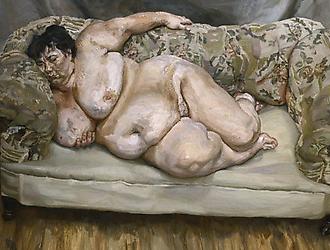
The Guardian
Lucian Freud Portraits - Review
February 5, 2012Lucian Freud painted strange, uneasy, figures, from first to last. Maybe they were uneasy because he was painting them. There was as much violence as tenderness in his stare, and in the ways he devised to paint...
Continue Reading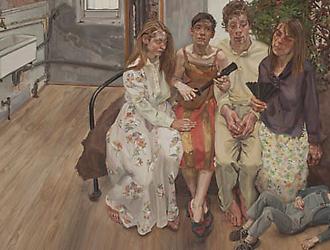
The Telegraph
Lucian Freud: Portraits, National Portrait Gallery, Review: A show that proves Freud's greatness
February 6, 2012The National Portrait Gallery has gathered by far the best large selection of Lucian
Freud’s work, says Richard Dorment, including plenty of surprises
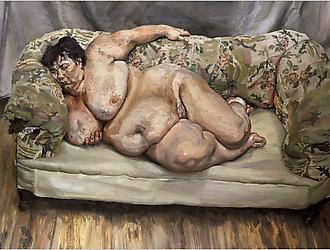
Vanity Fair
VF Daily
January 30, 2012The fourth floor of the Museum of Modern Art has a new resident. James Rosenquist's F-111, a monumental 23-panel piece, is being exhibited for the first time since 2006 in the original 1965 configuration that the artist created for his debut show at Leo Castelli's 77th Street gallery...
Continue Reading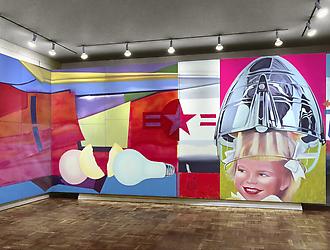
The Guardian
Lucian Freud - Reflections of the Artist
February 2, 2012"I really used the mirror as a device for an interior on a small scale," he explained. "Always the same mirror, which I like and know." For Lucian Freud the knowing and liking were mutually vital and this five-foot Georgian overmantel mirror stayed with him. It had come down in the world by the time he first set eyes on it in 1943 in the hallway at 20 Delamere Terrace, in what was then slum Paddington. It became one of his few possessions in the upstairs flat there overlooking the canal, along with a stuffed zebra head...
Continue Reading
The Telegraph
Unseen masterpieces by Lucian Freud unveiled for the first time
January 29, 2012A major new exhibition of Lucian Freud's works will feature previously unseen sketches from his childhood alongside portraits of his parents and his children.
Continue Reading
Financial Times
Financial Times
Lunch with the FT
October 1 / October 2, 2011Lunch with the FT: during a New York heatwave, influential dealer William Acquavella reflects on his personal and professional relationship with Lucian Freud and changes in the art world. "I don't go nuts if I don't get everything," he tells Peter Aspden
Continue ReadingARTINFO
Ben Stiller and David Zwirner Exult as Christie's Star-Packed "Artists for Haiti" Sale Tops $13 Million
September 23, 2011NEW YORK— "Artists for Haiti," a charity auction organized by actor Ben Stiller and art dealer David Zwirner
and held at Christie's this evening raised a rousing $13,662,000 to benefit health and education initiatives for
the earthquake-ravaged and desperately poor Caribbean country.

Town & Country
August 2011
"The Players' Club"
The auction floor is the ultimate shark tank. Meet its most ruthless predators.
Anyone who thinks the art world is dull hasn't visited an auction house's sales room. This is a place where the people with the foresight to sell wield just as much powers as those who can buy; where dealers bid into the millions just to maintain the value of their stock; and where advisers play the field in order to drive up their commissions. We polled dozens of art-world insiders to compile a list of the 10 most powerful people in the auction world today. They're the ones spending the most money, making the most money, and defining the market as we know it.
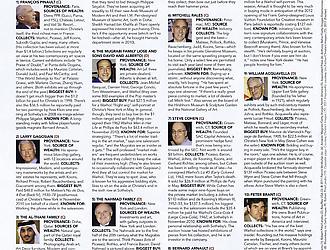
Wall Street Journal Magazine
The Partnership: The Master and the Gallerist
April 2011Lucian Freud, the British realist painter and famed libertine, and his genteel New York dealer, William Acquavella, have a 20-year relationship based on creative support and a little bit of damage control.
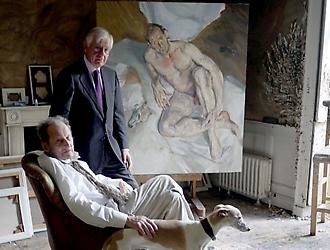
Frankfurter Allgemeine Zeitung
Keine Angst vorm Neuen
May 16, 2010Robert und Ethel Scull sammelten Pop-Art, lange bevor sie in die Museen kam. Eine New Yorker Ausstellung zeigt jetzt einen Teil ihrer legendaren Kollektion.
Aus New York berichtet Lisa Zeitz.

New York Times
Showing a Couple's Eye for Art (and Money)
April 10, 2010A half-century ago, before the phrase "Pop Art" was even coined, a taxi tycoon named
Robert C. Scull started buying up dozens of works by artists like Jasper Johns, Robert Rauschenberg and Andy Warhol...
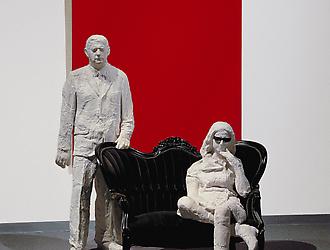
The yin and yang of Chinese Contemporary Art
http://www.artsjournal.com/realcleararts/2009/03/chinese-art.html
March 27, 2009Chinese Contemporary Artist Zeng Fanzhi Solos at Acquavella Galleries
http://www.artknowledgenews.com/Zeng_Fanzhi_solos.html
March 26, 2009New York Times: China's Art Market: Cold or Maybe Hibernating?
http://www.nytimes.com/2009/03/11/arts/design/11decl.html?_r=1
March 10, 2009Beijing Dealers See Silver Lining in Economic Downturn
http://www.artinfo.com/news/story/30707/beijing-dealers-see-silver-lining-in-economic-downturn/
March 9, 2009
Huffington Post
Calder, Picasso, and Morandi: Three Great Artists of the Twentieth Century
October 17, 2008By PATRICIA ZOHN
Continue ReadingLos Angeles Times
Picasso's 'Le Rêve": Restored, the painting goes on view
October 12, 2008By CHRISTOPHER KNIGHT
Continue Reading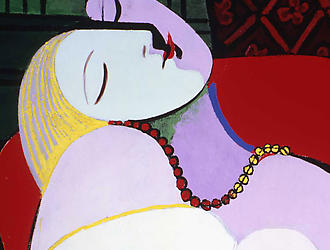
Bloomberg.com
Watch Those Elbows: Wynn's $139 Million Picasso Joins N.Y. Show
Sept. 26, 2008By LINDSAY POLLOCK
Continue Reading